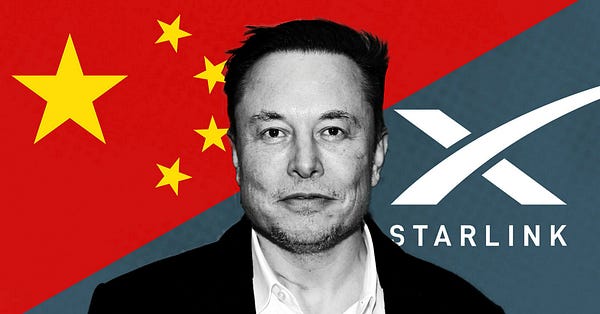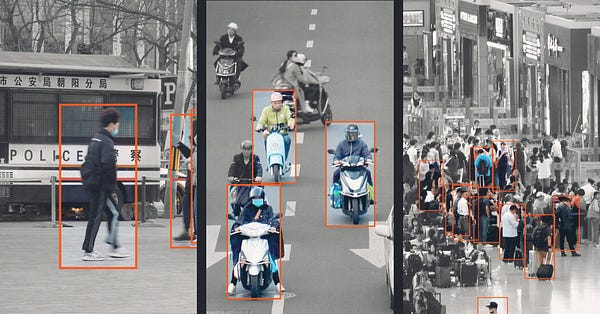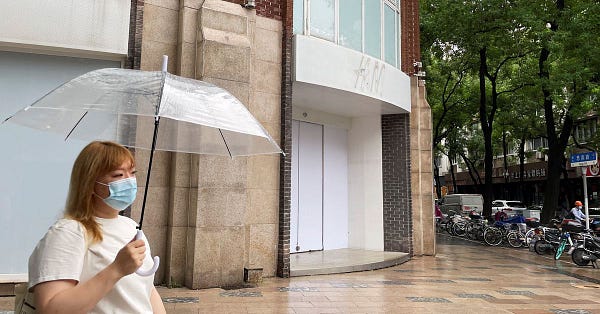Welcome to the 120th edition of Trade War.
Elon Musk’s Starlink gets on the bad side of China’s military. Tech companies are still running scared. And H&M shuts flagship Shanghai store.
Local governments misuse pandemic funds. Small and medium-sized enterprises are cutting workers and wages while college grads struggle to find jobs. And reinvigorated China bulls on flimsy ground.
Elon Musk’s Ukraine support upsets China
Elon Musk’s decision to support Ukraine’s Internet network against Russian attack with his company Starlink’s satellite kits has raised concerns in China, report the Financial Times’ Edward White and Eleanor Olcott.
“Blaine Curcio, founder of specialist space technology research group Orbital Gateway, said “significant alarm in China” had been caused because SpaceX and Starlink were considered critical parts of the “US space military industrial complex,”” report White and Olcott.
The fear is that Musk’s low-earth orbit satellites, which now total over 2,000 globally, could be “deployed to conduct surveillance of China or, more sensitively, support Taiwan,” the paper reports.
“There is a good chance that Starlink will be taken advantage of by the hegemony-obsessed US to bring the world into . . . chaos or calamity,” China Military Online, an official publication of the People’s Liberation Army wrote last month.
State-affiliated military researchers were “very clear” that Starlink “poses a threat to China,” a concern almost certainly ”shared by the Chinese government and military,” said Dexter Roberts, a US-China expert and senior fellow with the Atlantic Council.
The concerns could spillover and affect Tesla’s business in China, the country in which it earns a quarter of its global revenues, warns June Teufel Dreyer, a China specialist at the University of Miami.
Beijing will later impose restrictions on foreign companies invested in “competitive sectors and especially tech-related sectors” and “limit business practices that [the government] sees as having data and other security implications,” added Roberts.


‘Enhance US military combat capability’
“Starlink satellites can be mounted with reconnaissance, navigation and meteorological devices to further enhance the US military’s combat capability in such areas as reconnaissance remote sensing, communications relay, navigation and positioning, attack and collision, and space sheltering,” wrote China Military Online, translated here by retired U.S. diplomat David Cowhig.
Tesla’s growing China challenges
Check out my short interview on Tesla’s growing China challenges, with Feature Story News’ Patrick Fok.


Tech companies feeling ‘paranoia and paralysis’
Even as signs of a bull market for Chinese tech companies emerge once again, with Alibaba and Tencent stocks surging in Hong Kong and New York, entrepreneurs and venture capital investors are far more downbeat, report Bloomberg News’ Coco Liu, Zheping Huang, and Sarah Zheng.
Interviews with over a dozen industry players reveal feelings of “paranoia and paralysis” as well as the “unsettling realization” that the rapid growth rates of the past two decades are over, reports Bloomberg.
“On the face of it, China’s $1 trillion internet industry is finally emerging from a brutal reckoning. Jack Ma’s embattled Ant Group Co. is poised to revive a long-derailed initial public offering. Scores of new video games were recently greenlit for app stores. And after a sweeping data security probe, Beijing may soon let ride-sharing company Didi Global Inc. off with a mere fine,” writes the financial news service.
But a slew of government regulations introduced in 2021 that restrict the business of platform economy companies and allowable content on social media have left a deep chill over business, executives say.
“China’s tech crackdown has happened. There is no comeback from that,” a Beijing-based entrepreneur told Bloomberg. “The regulatory pressure on Chinese tech companies may have hit the brakes for now, given the sluggish economy, but it’s unthinkable that regulators in the country would loosen their grip on platform companies ever again.”

H&M shuts flagship Shanghai store
Hurt by Covid lockdowns and an earlier boycott, Swedish fast-fashion retailer H&M has shut its flagship store in Shanghai, reports Reuters.
After entering China with the opening of the Shanghai store in 2007, H&M rapidly expanded to reach a peak of more than 500 stores early last year. Today the H&M website only lists 376, reports Reuters.
While pandemic lockdowns have hurt its business most severely, Chinese consumers also stopped buying its products after the Swedish company voiced concerns last year about reports of forced labor in the mainly Muslim, cotton-producing region of Xinjiang, where as many as a million Uyghurs reportedly have been held in detainment camps.
While other brands including Zara, Nike, and Adidas also suffered from boycotts related to their stance on Xinjiang cotton, H&M, the first retailer to speak out, has been hit much harder.
“Unlike other brands, its products remain unavailable on major Chinese e-commerce sites such as Tmall and JD.com,” writes Reuters.
Local governments misuse pandemic funds
China’s auditors say that local governments have been misusing special purpose bonds and faking information in order to get pandemic subsidies, reports the South China Morning Post’s Amanda Lee.
Ten regions used 13.66 billion yuan ($2.03 billion) of special purpose bonds to fund business operations and to pay employee wages, rather than for infrastructure spending as they should have, reported China’s National Audit Office.
Meanwhile, with local governments tasked with paying for pandemic prevention measures such as mass coronavirus screening, twenty-six of China’s thirty-one provincial level governments falsified information to receive 543 million yuan of central government subsidies, the auditor said.
The land-related revenues that local governments rely on are expected to fall in 2022 while capital expenditures will rise by 19 percent, year on year, as China aims to stimulate the economy, according to Fitch Ratings.
“This will create a financing gap that will need to be funded by debt, particularly through special purpose bonds,” said Samuel Kwok, Fitch senior director.


SME’s cut wages, freeze hires
China’s struggling smaller enterprises - usually top job creators - are cutting wages and instituting hiring freezes, report the South China Morning Post’s He Huifeng and Luna Sun.
A report recently published by 51jobs.com that surveyed 950 companies shows how smaller firms have been hardest hit by recent lockdowns. Twenty-six percent of firms with fewer than 50 employees said their business dropped by as much as three-quarters between April and May, while 11 percent saw their business virtually come to a standstill.
Meanwhile, competition for jobs has soared as companies hire ever fewer people, the report noted. Just 27 percent of small and micro-sized companies have added staff as planned in 2022, with 20 percent instituting freezes.
That has hit migrant worker wages hard; in the first quarter salaries only grew by 3.5 percent compared to the same period in 2019, well below the inflation rate, Peng Wensheng, chief economist at China International Capital Corporation, wrote in a report last month.
“In the past, you could see a big booth standing in front of every factory in Dongguan, Shenzhen and Huizhou, recruiting workers around the clock,” Li Sheng, a factory director in Huizhou, told the Post. “This year, do you see any nearby factories with booths open at the gates?”


No jobs for grads
“China’s largest-ever graduating class [10.76 million students-strong] is dreaming small, cutting back expectations as its members face the country’s weakest job market in decades. As businesses scale down recruitment due to COVID-19 outbreaks and lockdowns, many undergraduates scramble for places in graduate programs and lower their salary expectations. Meanwhile, many graduates are putting security above all else, focusing their efforts on stable jobs in the state sector,” reports Sixth Tone’s Ni Dandan.



China bulls on flimsy ground
Investors expecting a sustained rebound in Chinese equities are too optimistic, says macroeconomic strategist TS Lombard, reports Bloomberg News.
Even as optimism about China’s shares grows, the country’s Zero Covid policy will stifle consumer spending and hurt the economy, wrote Lombard analysts in a recent note. The firm also downgraded Chinese stocks from moderately positive to neutral.
“The recent recovery in China’s shares has spurred debate on whether the worst is over after the authorities pledged to ease up on a tech crackdown while employing mass testing to prevent city-wide lockdowns,” reports the financial news service.
“What the equity bulls miss is that what drives the economy is the Chinese consumer, not the unending rollout of yet more fiscal stimulus measures,” the Lombard analysts wrote.
“The legacy of the damaging and personally stressful Shanghai lockdown and now mass testing are keeping the economic recovery in limbo by eroding consumer sentiment and sending savings soaring.”


Notable/In depth
“From iris scans to voice prints, phone tracking to DNA data, the Chinese authorities’ appetite for personal data is growing. Our latest visual investigation — drawing from over 100k documents — reveals new details of the data-hungry surveillance state,” writes Muyi Xiao, who along with Paul Mozur, Isabelle Qian and Alexander Cardia authored this alarming New York Times report.


“Chinese policymakers are attempting to create a sphere of influence comprising not just their country’s immediately contiguous region but also the entire emerging, non-Western, and largely nondemocratic world—the “global South.” Securing dominance over this vast swath of nations would provide a strong base for China’s power while restricting the United States’ actions and influence. Ultimately, that could help spell the end of U.S. global hegemony,” writes National Bureau of Asian Research Senior Fellow Nadege Rolland in Foreign Affairs.

“Propaganda codes,” or “homophonous pen names,” are in fact quite common in the Party-state media, and in the halls of power. They form an internal system of not-so-secret codes by which those in positions of power, both departments and individuals, can voice their official positions and put their stamp on a course or policy,” writes China Media Project director David Bandurski.


New book alert: Surveillance State
“The book documents the Chinese Communist Party's effort to build history's 1st full-fledged surveillance state: a blend of authoritarianism and AI with vast quantities of personal data that Beijing believes is capable of going toe-to-toe with -- and maybe vanquishing -- democracy,” tweets Wall Street Journal’s Josh Chin, who along with colleague Liza Lin has written the soon-to-be-published, Surveillance State: Inside China's Quest to Launch a New Era of Social Control.


Montana picture
Here are some views from a recent longish walk.





